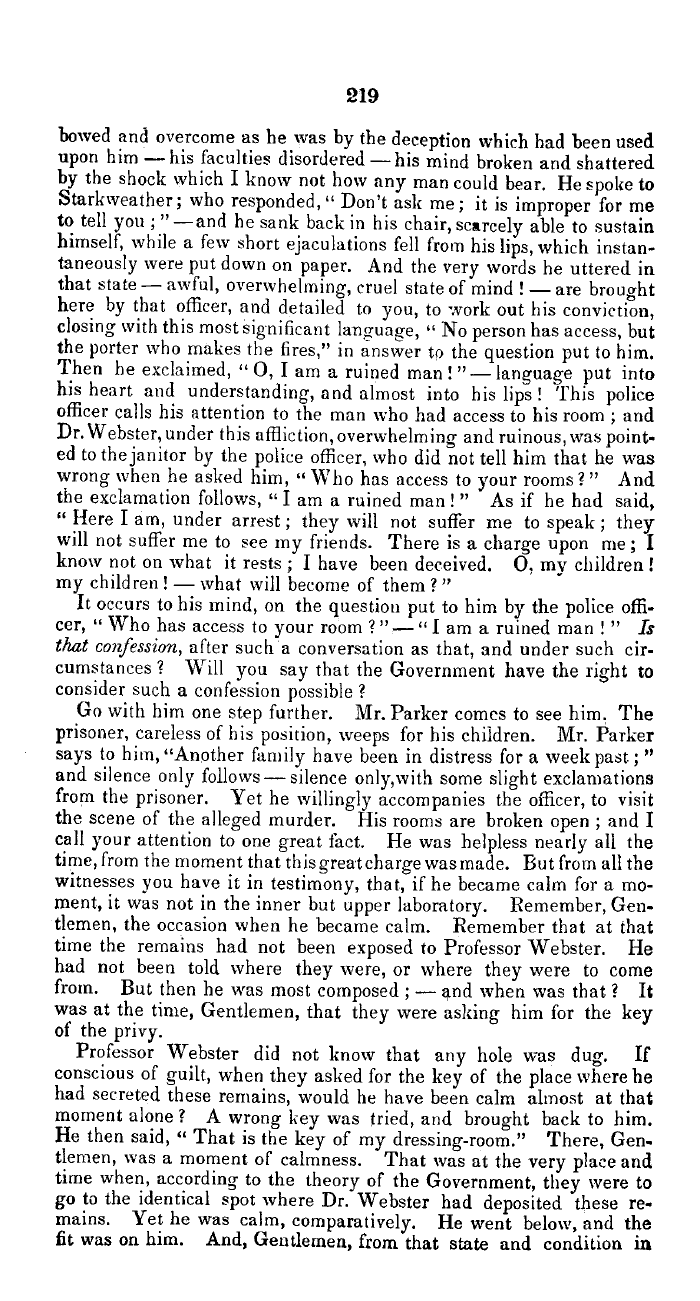|
219
bowed and overcome as he was by the deception which had been used
upon him -his faculties disordered-his mind broken and shattered
by the shock which I know not how any man could bear. He spoke to
Starkweather; who responded,"Don't ask me; it is improper for me
to tell you ; "-and he sank back in his chair, scarcely able to sustain
himself, while a few short ejaculations fell from his lips, which instan-
taneously were put down on paper. And the very words he uttered in
that state-awful, overwhelming, cruel state of mind!-are brought
here by that officer, and detailed to you, to work out his conviction,
closing with this most significant language, '° No person has access, but
the porter who makes the fires," in answer to the question put to him.
Then be exclaimed, " O, I am a ruined man!" -language put into
his heart and understanding, and almost into his lips ! This police
officer calls his attention to the man who had access to his room ; and
Dr. Webster, under this affliction, overwhelming and ruinous, was point-
ed to the janitor by the police officer, who did not tell him that he was
wrong when he asked him, °° Who has access to your rooms?" And
the exclamation follows, " ° I am a ruined man! " As if he had said,
"Here I am, under arrest; they will not suffer me to speak; they
will not suffer me to see my friends. There is a charge upon me ; I
know not on what it rests ; I have been deceived. O, my children !
my children! - what will become of them ? "
It occurs to his mind, on the question put to him by the police offi-
cer, " ° Who has access to your room ? "- « I am a ruined man ! " Is
that confession, after such a conversation as that, and under such cir-
cumstances ? Will you say that the Government have the right to
consider such a confession possible ?
Go with him one step further. Mr. Parker comes to see him. The
prisoner, careless of his position, weeps for his children. Mr. Parker
says to him, "Another family have been in distress for a week past;"
and silence only follows-silence only,with some slight exclamations
from the prisoner. Yet he willingly accompanies the officer, to visit
the scene of the alleged murder. His rooms are broken open ; and I
call your attention to one great fact. He was helpless nearly all the
time, from the moment that this great charge was made. But from all the
witnesses you have it in testimony, that, if he became calm for a mo-
ment, it was not in the inner but upper laboratory. Remember, Gen-
tlemen, the occasion when he became calm. Remember that at that
time the remains had not been exposed to Professor Webster. He
had not been told where they were, or where they were to come
from. But then he was most composed ; - and when was that ? It
was at the time, Gentlemen, that they were asking him for the key
of the privy.
Professor Webster did not know that any hole was dug. If
conscious of guilt, when they asked for the key of the place where he
had secreted these remains, would he have been calm almost at that
moment alone? A wrong key was fried, and brought back to him.
He then said, °° That is the key of my dressing-room." There, Gen.
tlemen, was a moment of calmness. That was at the very place and
time when, according to the theory of the Government, they were to
go to the identical spot where Dr. Webster had deposited these re-
mains. Yet he was calm, comparatively. He went below, and the
fit was on him. And, Gentlemen, from that state and condition in
|

